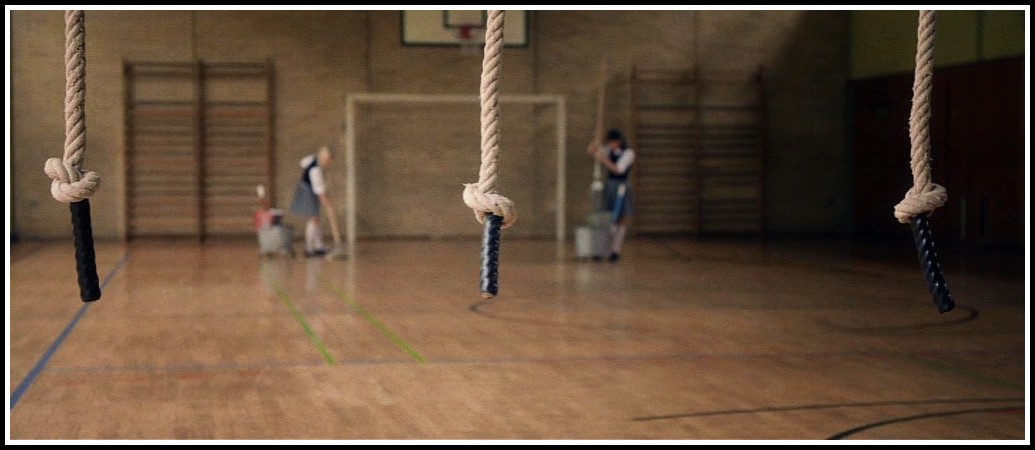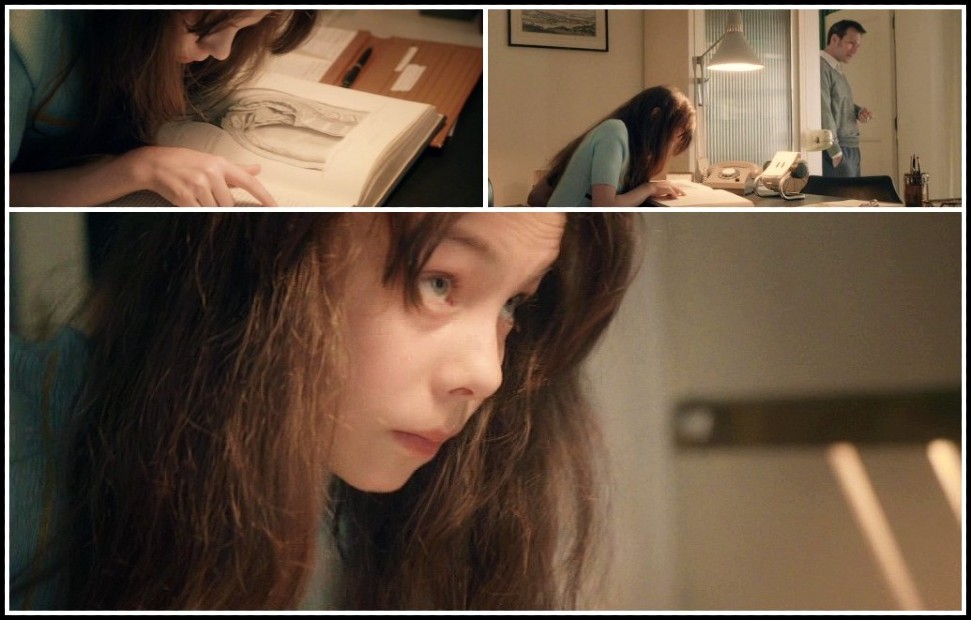
PART I: NYMPHOMANIAC, OR THE SOLITUDE OF DESIRE | PART II: THE LOVE/SEX SPLIT IN ADDICTIVE SEXUALITY
PART I: NYMPHOMANIAC, OR THE SOLITUDE OF DESIRE
On the film by Lars von Trier
Richard Jonathan
All Nymphomaniac images are from Nymphomaniac—The Director’s Cut (Artificial Eye DVD, 2015). All composite images made by R.J.

Nymphomaniac, Lars von Trier | ‘It all strengthened my wish for a serious education.’ Seligman imagines Joe’s sex education.
I. INTRODUCTION: THE NATURE OF DESIRE
A. LUCRETIUS
One drop of sweetness in the heart, and then
A cold anxiety.
Eagerly
They press their bodies close, join lips and tongues,
Their breath comes faster, faster. All in vain,
For they can gather nothing, they cannot
Effect real penetration, be absorbed
Body in body, utterly. They seem
To want to do just this. God knows they try,
Cling to each other, lashed in Venus’ chains
Till finally, all passion spent, they die,
Relaxed completely from that violence,
Melted, undone; so, for a little time,
The furious fire subsides. But it will blaze,
Break out again in madness, and they’ll seek
Again whatever it is they want to reach,
Find no prescription, no device to stop
This rank infection, so they peak and pine,
Confused and troubled by their secret wound.
Lucretius, De rerum natura
Book IV, lines 1060-61 and 1005-16
From Lucretius, The Way Things Are: The ‘De rerum natura’ of Titus Lucretius Carus, tr. Rolfe Humphries (Indiana University Press, 1969)

Lars von Trier, Nymphomaniac
B. JACQUES LACAN: FIVE TRAITS OF DESIRE
Jacques Lacan is a French psychoanalyst who ‘invented a way of thinking about mental life and its vicissitudes that is at once Socratic and technical, speculative and precise, a way of thinking that focuses minute attention on the details of subjective experience in order to discover an orderliness in both the depths of interior life and the heat of interpersonal relationships’.
Michael V. Miller, foreword to Jacques Hassoun, The Cruelty of Depression: On Melancholy, tr. David Jacobson (Adisson-Wesley, 1997)
1. ‘Desire is the essence of man’, it is the heart of human existence.
2. There is a fundamental ‘incompatibility between desire and speech’. This incompatibility explains the irreducibility of the unconscious (the unconscious is not that which is not known, but that which cannot be known).
3. Desire can never be satisfied; it is constant in its pressure, and eternal. The realization of desire does not consist in being ‘fulfilled’, but in the reproduction of desire as such.
4. Desire is essentially desire to be the object of another’s desire.
5. Desire is always ‘the desire for something else’, since it is impossible to desire what one already has. The object of desire is continually deferred: As soon as the object of desire is attained, it is no longer desirable, and the subject’s desire fixes on another object.
Adapted from Dylan Evans, An Introductory Dictionary of Lacanian Psychoanalysis (London: Routledge, 1996), pp. 36-39. The other quotes from Lacan in this post are also from this source.

Lars von Trier, Nymphomaniac
II. NYMPHOMANIAC, OR THE SOLITUDE OF DESIRE
Richard Jonathan
‘One drop of sweetness in the heart, and then a cold anxiety’: Lucretius here is talking about desire and the impossibility of satisfying it. Joe, the heroine of Nymphomaniac, says: ‘For me, love was just lust with jealousy added; everything else was total nonsense. For every hundred crimes committed in the name of love, only one is committed in the name of sex’. For Jacques Lacan, ‘to love is, essentially, to wish to be loved’. He theorizes that love occurs in the realm of the imaginary (along with other illusions such as wholeness and autonomy) while sex is rooted in the real, that is to say in the domain of ‘that which resists symbolization absolutely’, and as such is opposed to meaning. Moreover, for Lacan, ‘sex, in opposing itself to sense, is also, by definition, opposed to relation, to communication’. Is it any wonder, then, that Nymphomaniac is a film about solitude?

Lars von Trier, Nymphomaniac
Lars von Trier, as I wrote in my acrostic on The Element of Crime, is for me ‘the most exciting filmmaker of the past three decades—and more’. That Nymphomaniac was maligned by mediocrities did not surprise me, nor did the fact that the film-going public, true to form, preferred high-gloss vacuity to gritty substance. Still, I was saddened that this magnificent film that Lars drew out his solitude after being declared persona non grata at Cannes in 2011 was not received more warmly. Why? Because, as the world acquires a taste for illiberal societies, the freedom of which Nymphomaniac is a vector offers a model of resistance. Indeed, each of us, in experiencing the singular truth wrapped up in our desire, becomes an individual, and individuality makes us less likely to fall prey to the sirens of ideology (be it hyperconsumerism or religion, populism or PC) that are making our world more ugly.

Nymphomaniac, Lars von Trier | ‘Playing frogs was one of B.’s classics.’
Nymphomaniac, then, is a story about the assumption of one’s desire and the extreme solitude that necessarily ensues. Joe, in her fictional universe, is, in this respect, a reflection of Lars in our all-too-real world (who would have thought that France, the land where the figure of the artist is not yet reduced to a purveyor of market-driven mediocrity, would take at face value an attempt to be witty that went badly wrong? For more on this, see this interview with Lars.)

Lars von Trier, Berlin Film Festival, 2014
Let us now focus on the film itself, and the mystery that is Joe. Lucretius, in the extract on sex, speaks of a ‘secret wound’. The intelligence and grandeur of Nymphomaniac, its elegance and dignity, derive largely from the fact that it refuses to offer us an explanation of Joe’s ‘secret wound’. Instead, thanks to Lars’ use of Brechtian distancing—the alternation of action and reflection, desire and speech—it invites us on a voyage of discovery. Of what? Our own intimacy. How many of us have the courage to take up the challenge?

Lars von Trier, Nymphomaniac
Language aims at transparency. Sexuality defies transparency. Joe, in speaking of her sexuality, is, on one hand, authentic and engaged, and on the other hand, doomed to ‘misrecognize’ what she is talking about. Misrecognition, in Lacan’s conception, is not ignorance, but ‘a certain organization of affirmations and negations to which the subject is attached; behind his misrecognition, there is a kind of knowledge of what there is to misrecognize’. Not an entanglement we can count on Seligman to untangle. We are left, then, where all great art leaves us: in front of the mirror of our own misrecognition. Nymphomaniac, we see, is a film that illuminates the impossibility of language (and indeed, representation) to illuminate sex. For the adventurous viewer, it is an Alice-in-Wonderland looking glass; for the risk-averse, it’s a rabbit hole they’d rather not enter. As for the hacks who, incapable of rising to the film’s challenge, trash it, they simply prove that ‘the opposite of stupidity is not intelligence, but humility’ (Gilles Deleuze).

Nymphomaniac, Lars von Trier | ‘It was during that period where every sexual sensation was denied me,
a period of secure and restful domestic comfort, that I became pregnant.’
Sexuality, however, is not reducible to sex: Our relation to the sexual is conducted via its unconscious signification. In other words, sexuality is mediated by fantasy. What do we know of Joe’s fantasies? ‘It would turn me on enormously to imagine a sexual situation in which verbal communication was impossible’, she says, referring to the scenario with the African lover(s) she’d set up.

Nymphomaniac, Lars von Trier | ‘To be with a man with whom I shared no spoken language:
I could feel that it turned me on enormously to imagine a sexual situation in which verbal communication was impossible.’
There’s also Jerome’s hands and G’s grace which solicit a response in her fantasy. But beyond these examples, nothing. All we see are Joe’s acts. This largely accounts for her mystery, and until we accept that she has made of her eroticism (as Beauvoir said of Sade) ‘the sense and expression of her entire existence’, we tend to hanker after some key that would unlock that mystery. Indeed, her intelligence and articulacy, her evident understanding of others’ psychology, keep us in expectation of some ‘revelation’. By the end of her story, while much about Joe was still up in the air—just how influential in her make-up, for example, was her love for her father and her disdain for her mother?—I’d concluded, again as Beauvoir said of Sade, that the key to her eroticism (wherein lies the key to her mystery) is her ‘alliance of insatiable sexual appetite with radical affective isolation’.

Lars von Trier, Nymphomaniac
Not much fantasy, love for no-one (except Jerome): This dual near-absence deprives us of any ‘handle’ we might have used to ‘get a grip’ on Joe. She is nothing but desire, and in her desire she is sovereign. Like Leonard Cohen’s Suzanne, she is content to ‘hold the mirror’ while we, until we accept her on her own terms, look for a key to her mystery ‘among the garbage and the flowers’. Despite all her physicality, it is with her mind that Joe, by the end of the film, ‘has touched [our] perfect body’. A beautiful paradox.

Lars von Trier, Nymphomaniac
Joe, then, is a magnificent character. Let us not forget, however, that besides the ‘erotic case study’ dimension that the Joe+Seligman scenario encourages us to pursue, she is also a fine metaphor of Lars von Trier’s radical lucidity and relentless courage. ‘To live outside the law you must be honest’: Every artist, to the extent that he/she assumes their individuality, is an outlaw. From the honesty of his outsider state, Lars shines a light into the darkness of our hypocrisy:
– What was Hitler, when it all boils down, other than a man to whom society gave free rein?
– Each time a word becomes prohibited, you remove a stone from the democratic foundation.
– That empathy you claim is a lie, because all you are is society’s morality police.
Beyond such pronouncements from Joe, it is the film in all its ‘pornography’ that demonstrates how lucidity and courage are components of spiritual hygiene.

Lars von Trier | F-U-C-K tattoo
At the heart of Nymphomaniac is the question of ethics. It is not a film ‘about’ ethics (no work of art is ever ‘about’ anything); rather, it is a film which, to the extent that it invites us to understand Joe, challenges us to articulate our own ethics. From a Lacanian perspective, the key ethical question is: ‘Have you acted in conformity with the desire that is in you?’. Civilized morality, as Freud demonstrated, is pathogenic, and induces guilt in the subject. In analysis, ‘when the analysand presents the analyst with a sense of guilt, the analyst’s task is to discover where the analysand has given way on his desire’. Indeed, from an analytical point of view, ‘the only thing of which one can be guilty is of having giving ground relative to one’s desire’ (Lacan). This has nothing to do with a hedonistic or libertine ethos, nor does it have anything to do with ‘doing good’ by ‘curing’ the subject and helping him ‘adapt to reality’. Indeed, the ethics in question in Nymphomaniac, far from being normative, is an ethics that respects the subject’s right to resist domination.

Lars von Trier, Nymphomaniac | Joe and her soul
And therein lies Lars von Trier’s genius: to have chosen a character subject to the tyranny of an obsession to demonstrate that realizing one’s humanity entails resisting domination. Joe, assuming her responsibility, pursues freedom, but instead of trying to escape her obsession, she goes deeper into it. She is an affront to every ‘normal’ person, and a delight to every outsider. In being loyal to herself, she is transgressive: her courage puts conformists to shame.

Nymphomaniac, Lars von Trier | ‘Normally, a nymphomaniac is seen as someone who can’t get enough,
and therefore has sex with many different people…’
Desire, as Lacan puts it in his seminar on ethics, ‘is nothing other than that which supports an unconscious theme, the very articulation of that which roots us in a particular destiny, and that destiny demands insistently that the debt be paid, and desire keeps coming back, keeps returning, and situates us once again in a given track, the track of something that is specifically our business’. It is an ‘ethics of the singular’, and Lars von Trier, in showing us how Joe lives it out, puts forth the proposition that ‘ethics cannot be centred on general, universally valid rules, but on a singular jouissance that withdraws from all forms of generality or universality’. In a word, it is an ethics profoundly respectful of the person, and not of social personae.

Nymphomaniac, Lars von Trier | ‘Well that of course is true, but if I’m to be honest,
I see it precisely as the sum of all these different sexual experiences…’
One can only admire the talent and dignity, the trust and generosity, of Charlotte Gainsbourg and Stacy Martin, Shia LaBoeuf and Jamie Bell (and, indeed, all the other actors, including the porn doubles) for having contributed so greatly to making Nymphomaniac a film in which Lars von Trier gives us a brilliant lesson in ethics wrapped up in radical lucidity and relentless courage. His movie, because it enacts the problematic of freedom in a way that consistently engages both our feelings and our critical faculties, is a film for adults, and not a mere ‘adult’ film. Out of the paradox of Joe’s démarche, Lars has made a compelling work of art.

Nymphomaniac, Lars von Trier | ‘So in that way, I have only one lover.’
MARA, MARIETTA: A LOVE STORY IN 77 BEDROOMS
A literary novel by Richard Jonathan
PART II – ‘NYMPHOMANIAC’: A PSYCHOANALYTIC INTERPRETATION
THE LOVE/SEX SPLIT: THE NYMPHOMANIA/FRIGIDITY DYNAMIC IN ADDICTIVE SEXUALITY
Vincent Estellon
Vincent Estellon, Psychoanalyst, Professor of Psychology, Université Paul Valéry Montpellier 3
Adapted and abbreviated by Richard Jonathan from Vincent Estellon, ‘Le clivage amour/sexe : la dialectique nymphomanie/frigidité dans la sexualité addictive’ in Le Carnet PSY 2015/5 (N° 190), pages 43-48.
Translated here, and supplemented with direct quotes from the film, by Richard Jonathan. Except where otherwise noted, all Freud quotations are from ‘A Special Type of Object Choice Made by Men’ (1910) and ‘The Most Prevalent Form of Degradation in Erotic Life’ (1912) in Sigmund Freud, Sexuality and the Psychology of Love (NY: Touchstone, 1997, pp.39-60).

Nymphomaniac, Lars von Trier | ‘I’d hang there for ages, with the rope between my legs. “The sensation”, we called it.’
A. NYMPHOMANIAC: SEVEN PRELIMINARY OBSERVATIONS
1. If Joe must endlessly repeat the sexual act, it is because her compulsion to repeat bears the mark of both desire and its non-satisfaction.
2. Joe’s ardor is so intense that nothing can satisfy it, except, perhaps, pain. Commensurate with the anxiety related to the emptiness she feels, she tells her lover: ‘Fill all my holes’. When she engages in sex her ‘cunt’ becomes a mouth, primitive and insatiable, and we see how partial sexuality, pregenital and anarchic, colonizes the genital.

Nymphomaniac, Lars von Trier | ‘The train trip had increased my appetite.’
3. Discussing the forty lashes she’d received from K. at Christmas, Joe genitalizes anal sexuality in a cloacal confusion: she comes ‘from behind’ as her buttocks bleed. Note that it is only when she abandons her identity as ‘wife’ and mother that she is able to orgasm again.
4. In Joe’s acting out with K. her sadomasochistic fantasy, we see the effect of an insufficiently repressed version of the incestuous phase of the ‘a child is being beaten’ fantasy (Freud, 1919), that is to say, the second phase wherein ‘the person doing the beating remains the father, but the child being beaten is now the child producing the phantasy’. The incestuous Oedipal desires, which in neurotics generally do not pass into consciousness, here invade the ego, overwhelming it with anxiety. A devastating feeling of guilt is then experienced in the mode of a self-accusatory melancholy. We can now understand why finding someone (K.) in external reality with whom to act out her (internal) fantasy paradoxically soothes Joe, in that this perverse arrangement allows her to maintain an infantile sexual position without losing her father’s love.

Nymphomaniac, Lars von Trier | ‘I was able to loosen my position a bit
and thereby stimulate my clitoris against the cover of the book.’
5. By letting herself be punished, Joe punishes herself for the dual fault of having wanted to seduce and having been seduced by the Oedipal father, while still enjoying the masochistic pleasure of being beaten by this exciting and excited object. And perhaps, also, while being beaten, she feels more alive: the active pursuit of bodily pain paradoxically relieves her of the burden of a massive but nebulous anxiety (see Self-harm: Cutting). To escape the anguish of her internal world, then, Joe seeks out bodily sensation, be it of pleasure or pain.

Nymphomaniac, Lars von Trier | ‘There was a world far from mine I had to explore.
And there, or perhaps on the other side, get my life back.’
6. The beating scenario is akin to the configurations of perversion characterized by self-sacrifice commonly found in borderline personalities. Rather than hating someone else, Joe despises herself, disqualifies herself, attacks both her body and the resources of her psyche. Here, her superego, cruel instead of protective, makes her experience her desires as demonic forces, bad and impure. We see in her a particular form of an externalized superego that punishes the ego through compulsive acts. Due to the porosity of the borders between the conscious and unconscious systems, unconscious guilt—not contained in this instance by psychic barriers—is directed straight at the ego through the attacks of the erotic body.

Nymphomaniac, Lars von Trier | ‘A last desperate attempt to rehabilitate my sexuality.
I don’t know where we get our sexuality from, nor where tendencies of this kind come from.’
7. If for Freud the superego is the legacy of the Oedipus complex, what can we say of Joe’s moral conscience? For her, the sexes and the generations are confused, they are insufficiently differentiated. For example, when her father is dying on his hospital bed, her mother is strangely absent. Joe accuses her mother, denounces her absence and insults her, but the father defends the mother. The fact remains that it is Joe alone who is present at her father’s last breath.

Nymphomaniac, Lars von Trier | Sex as self-soothing: Joe in the hospital where her father is dying.
We see here a confusion of symbolic places: Joe is occupying the place of both daughter and wife. In light of this, we can better understand why she is driven to escape that incestuous trap by going to fuck the first guy she encounters.

Nymphomaniac, Lars von Trier | ‘When he died I had no feelings left. It was very shameful. I lubricated.’
B. NYMPHOMANIAC: ANALYSIS
Joe presents a set of symptoms that goes by the name of nymphomania, addictive sexuality, or neo-sexuality. Her case condenses various clinical issues that fall within the province of borderline functioning. Her sexual dependence is amenable to a multi-model investigation in which hysteria, borderline conditions, obsessive-compulsive disorders, masochism and perversion are all brought into play.

Nymphomaniac, Lars von Trier | ‘My first orgasm came upon me without the slightest touch, in some strange way, up in the mountains.
I never had achieved an orgasm before, even though I masturbated as if my life depended on it during that time.’
An incident occurs in the final chapter of the film that is of particular significance. Making a house call in her role as a criminal-underworld debt collector, Joe uses her psychological skills to discover a shameful secret of the debtor, knowledge which she will use to make him pay up. As he sits roped to a chair before her, she tells him: ‘I can’t find a stain on you, but my experience tells me that no man is spotless. Luckily, you’re equipped with a very reliable truth-detector. I’m going to tell you a few stories. All you have to do is listen.’ The truth-detector in question is the man’s penis: to what verbal stimuli will it respond?

Nymphomaniac, Lars von Trier | ‘Luckily, you’re equipped with a very reliable truth-detector.’
Having pulled down the man’s trousers to free his penis, Joe then ‘meticulously went through the catalog of sexual deviations in fictional form. Stories about sadomasochism, fetishism, homosexuality, you name it. But he didn’t react.’ On the verge of giving up, she tries one more scenario: ‘On your way home, you walk through the park. Something makes you stop. You hear something. Yes, that’s it. You can hear the children in the playground. You sit on a bench nearby and watch them play. There’s a little boy in shorts. He’s playing in the sandpit. He looks at you with his blue eyes. He smiles at you. I think he comes to you. He sits on your lap and looks up at your face. He says he’d like to come home with you. At home you can’t fight the idea of being naked together. He crawls all over you. You get an erection. He lies on his stomach. You pull down his pants.’ At which point, his penis now fully erect, the man blurts out: ‘I’ll pay!’.

Nymphomaniac, Lars von Trier | ‘Won’t you please stop? I’ll pay!’
Joe then proceeds to ‘give the man a blow job’. When Seligman asks her why she did this, she explains: ‘I took pity on him. I had just destroyed his life. Nobody knew his secret, most probably not even himself. He sat there with the shame. I suppose I sucked him off as a kind of apology. This is a man who’d succeeded in repressing his own desire, who had never before given into it right up until I forced it out. He had lived a life full of denial and had never hurt a soul. I think that’s laudable.’ When Seligman responds that he ‘can’t find anything laudable in pedophilia’, Joe says: ‘That’s because you think about the perhaps 5% who actually hurt children. The remaining 95% never live out their fantasies. Think about their suffering. Sexuality is the strongest force in human beings. To be born with a forbidden sexuality must be agonizing. The pedophile who manages to get through life with the shame of his desire while never acting on it deserves a bloody medal. But there was another reason for my sympathy: I saw a man who was carrying the same cross as myself. Loneliness. We were both sexual outcasts.’

Nymphomaniac, Lars von Trier | ‘I saw a man who was carrying the same cross as myself. Loneliness.
We were both sexual outcasts.’
This scene is particularly important in the chain of associations the film generates. If Joe feels pity for this man—she who, more often than not, never feels anything for anyone—it is because he resembles her in that he too is caught up in a fantasy that stages the attraction of an adult for a child, echoing her own fantasy that features a child (herself) attracted to and inundated with excitation by an adult (her father). (Note that she is just as unaware of her fantasy as the man is of his.) It is she who provoked and staged this ‘confession’ and resolved it by acting out her compulsion to perform a (consoling) fellatio on the man she’d aroused. This incident illustrates how—as can often be observed in borderline behavior—external reality is used to access an internal phantasy. In this perverse performance, external reality ‘took the place’ of a faltering internal one.

Nymphomaniac, Lars von Trier | ‘Nervus… pudendus. Nervus dorsalis clitoridis.…’
For psychoanalysis, the serial pursuit of sex partners may be driven by unconscious factors: the ever-renewed dependence on the current object might be an attempt on the part of the adult to free him/herself from a fixation on a childhood object, an irreplaceable one that now undermines his/her sex life. Like a paper garland of cutout figures, a single model ‘generates’ the serial copies. Of whom must one become independent? For or against who must one indulge in diversion? Whose face is hidden behind the mask of serial bodies, each as anonymous as the other? What, indeed, might ‘anonymous sexuality’ actually mean? And how do the extensive resources of psychosexuality come to be reduced to mere discharge, their most elementary expression? Does not the incalculable number of partners consumed mask a fetishistic attachment to a single object preserved deep inside? When all is said and done, might one find in Joe certain modalities of ‘a special type of object choice made by men’? Freud demonstrated that sexual activity in certain men is ‘capricious, easily upset, often clumsily carried out, and not very pleasurable’. He highlighted the split between love and desire that characterizes their erotic life: ‘Where they love they have no desire, and where they desire they cannot love’.

Nymphomaniac, Lars von Trier | ‘Fill all my holes.’ ‘I can’t, Joe.’
Freud showed that some men can only fully express themselves sexually when they resort to ‘easy’ women who do not deserve high esteem. He makes a distinction between the sensual current (‘love for a harlot’) and the tender current (‘love for the mother’). This division could account for the persistence of a fixation on an incestuous object. Freud explains: ‘The sensual feeling that has remained active seeks only objects evoking no reminder of the incestuous persons forbidden to it; the impression made by someone who seems deserving of high esteem leads not to sensual excitation but to feelings of tenderness which remain erotically ineffectual. In such people, erotic life remains dissociated, divided between two channels that art personifies as heavenly and earthly love. The pressing desire in the unconscious for some irreplaceable thing often resolves itself into an endless series in actuality—endless for the very reason that the satisfaction longed for is in spite of everything never found in any surrogate.’

Nymphomaniac, Lars von Trier | ‘I have a tiger on my hands.’ ‘You mean I’m too much for you?’
‘No. I was just thinking I could use a little help with the feeding.’
Studying the mental functioning involved in psychical impotence (‘manifested by a refusal on the part of the sexual organs to execute the sexual act even though a strong mental inclination to do so is present’) led Freud to develop a number of insights. First, he noted that the man ‘describes having had a sensation of holding back, of having perceived some check within him which interfered with his conscious intention’. Second, he observed that ‘the most universal feature of this pathogenic material is an incestuous fixation on mother and sister which has not been surmounted’. Third, he noted that ‘the fixations of the child’s feelings of affection are maintained through childhood, continually absorbing erotic elements, which are deflected from their sexual aims.’ Then, he concluded, when the age of puberty is reached, things change: ‘There supervenes upon this state of things a powerful current of sensual feeling the aims of which can no longer be disguised.’ Let us now turn to looking at how these insights might help us understand Joe.

Nymphomaniac, Lars von Trier | ‘He shoved his cock inside me and humped me three times.’
When Joe and Jerome begin living together—a time when the tender and sensual currents are apt to unite—Joe, in bed, ‘can’t feel anything’. As she tells Seligman, ‘I lost all sexual sensation. My cunt simply went numb.’ The organ most eroticized by her ego ‘stops working’. ‘The ego function of an organ is impaired if there is an increase in its sexual significance. An inhibition is the manifestation of a restriction in ego function. For example, in cases where piano-playing, writing and even walking are affected by inhibitions, psychoanalysis shows that this is caused by excessive eroticization of the organs involved, namely the fingers and feet’ (Freud, ‘Inhibition, Symptom and Anxiety’ [1926], in Beyond the Pleasure Principle, Penguin Modern Classics, 2003, pp. 155-56).

Nymphomaniac, Lars von Trier | ‘The worst thing that’s happened to me: within seconds I lost all sexual sensation.
My cunt simply went numb.’
We can assume that for Joe maternity only makes matters worse, in that in becoming a mother she inherits—unbeknown to herself—a cruel and authoritarian maternal superego that does not allow her to experience pleasure with the father of her child. The hate that inheres in her rivalry with her mother makes it impossible to identify with her. For Joe-become-mother, the fact of seducing all men except her partner-become-father could be a paradoxical way to separate the bad mother from the good (Oedipal) father whose love she alone still retains. It is likely that from Joe’s latency period unfinished business remains, namely an insufficiency in ego construction and defense organization. The desexualization and sublimation of the Oedipus complex has not taken place. Indeed, Joe has not renounced her frenetic penis envy nor has she identified, even ambivalently, with her mother: she is still far from attaining the ‘normal’ position of a calm nostalgia for the penis.

Nymphomaniac, Lars von Trier | ‘The one who’d fucked the most men when we’d reached the destination
would win the chocolate sweets.’
Nymphomaniac shows how Joe’s compulsive behavior is established in adolescence, a period when Oedipal conflict is resurgent, internal excitation on the rise, and the means to contain childhood excitation in decline. It is typically during adolescence that, following upon external (parental) prohibition, the incest prohibition is internalized. Depending on how well the taboo is transmitted (for example, does it go beyond the limited framework of a personal matter between adult and child?) and the way in which it is integrated into the identification process, symbol-generating references will form to provide barriers between the conscious and unconscious systems; moreover, they will build up the superego and moral conscience. Joe, in the face of her failing moral conscience, resorts to the absurd reign of chance: a throw of the dice will determine her attitude toward her lovers. And thus she dresses the demon of her repetition compulsion in the vestments of six affective positions, each one a semblance of a living temporality. In fact, in the ‘theater of her body’ Joe has already left the scene; she is absent to herself, and something inside her has died, something that nothing can revive. Given the extent to which incestuous desire saturates her fantasies, it is clear that the work of repression that would have enabled her to internalize the incest taboo and censure her desire was insufficiently accomplished.

Nymphomaniac, Lars von Trier | ‘It turned out to be shockingly easy: Look them in the eye and smile.’
We are now in a better position to understand Joe’s desperate use of counter-cathexes in external reality to combat the anxiety and excitation that persecute her internally. For example, we see in the beatings she solicits from K. her means of staging in external reality the cruelty of her superego. By taking men for penises, metonymically, she degrades them, and thus maintains her stance of phallic rivalry.

Nymphomaniac, Lars von Trier | ‘I made the cage nice and cozy for her. Betty was excited.’
For example, she dumps men—potential fathers—serially. When she manages to ‘have’ a man-penis, he subsequently falls from his idealized position. Frigidity, like hyper-active sexuality, can thus be understood as a form of contempt for sex. What Joe stages is even stronger than contempt: it is akin to a murder of sexuality.

Nymphomaniac, Lars von Trier | ‘You wouldn’t give up your load? … Wow!’
VINCENT ESTELLON: THREE BOOKS (IN FRENCH)
Click or tap on the image to go to a description of the book
VINCENT ESTELLON
Les sex-addicts
VINCENT ESTELLON
Les états limites (Borderline)
VINCENT ESTELLON
Terreur d’aimé et d’être aimé
MARA, MARIETTA: A LOVE STORY IN 77 BEDROOMS
A literary novel by Richard Jonathan
LARS VON TRIER, NYMPHOMANIAC: SOUNDTRACK

LARS VON TRIER, NYMPHOMANIAC: SOUNDTRACK
By Richard Jonathan | © Mara Marietta Culture Blog, 2022 | All rights reserved







Comments